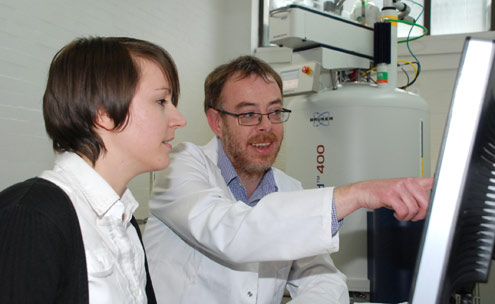The molecular 'sponge'
Wed, 09 May 2012 12:48:00 BST
Chemical engineering could create molecules that soak up toxic substances

Dr Craig Rice and researcher Rebecca Fennessy
BY thinking small – very small – University of Huddersfield chemistry researcher Dr Craig Rice can envisage massive developments in technology, including the equivalent of a super computer in every household.
“Perhaps one day we could all have our own super computer that would be so small it could be worn as if was jewellery, such as a earring or necklace!” he says.
“You would become almost integrated with the computer because it would be so powerful,” adds Dr Rice. He is looking towards a distant scientific horizon, but a start can be made now, he argues, by adopting a “bottom-up approach” to new technology.
Instead of continuing with a top down approach – the miniaturisation of technology, which is bound to reach the limits of possibility – Dr Rice is investigating the possibility of beginning with the creation of a molecule, programming it with information, and then growing it.
“The practical applications from the bottom-up approach are huge. If we can control matter on a molecular level to construct devices, then the world is our oyster. For example, if you can make an integrated circuit using this bottom-up approach, you could store vast, unbelievable amounts of data.”
Chloroform extraction research
But while he keeps an eye on the bigger picture, Dr Rice’s current research includes the intriguing possibilities offered by the extraction of chloroform from molecules created in the lab.
It has been discovered that when these molecules grows, they contains pockets filled with chloroform.
“What we aim to do is take this molecule and get rid of the chloroform, so that effectively you have a sponge with holes inside that are exactly chloroform-shaped,” explains Dr Rice.
This could have an important practical application, because the molecular ‘sponge’, when added to water, would soak up any chloroform present, therefore ridding the liquid of this toxic substance.
Water treatment plants and the purification of effluent from chemical factories would be among the practical applications for this example of bottom-up chemical engineering. And the implications are wider still.
“If you can create molecules that do this sort of thing, there are almost an infinite number of applications,” says Dr Rice.
For example, molecules could be programmed so that they grew pockets not only for chloroform, but for other toxic substances such as lead.
The research leading to these developments is cutting-edge, lab-based science at the University of Huddersfield. But, says Dr Rice, he is really only emulating nature.
He builds molecules in a test tube and gives them instructions. Nature does the same, by growing molecules that determine such things as family resemblances.







